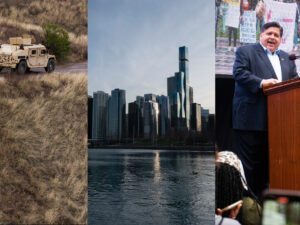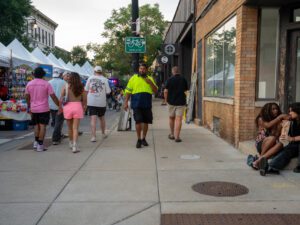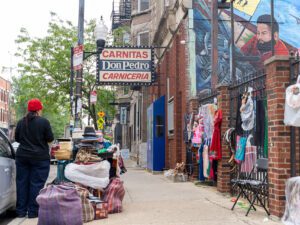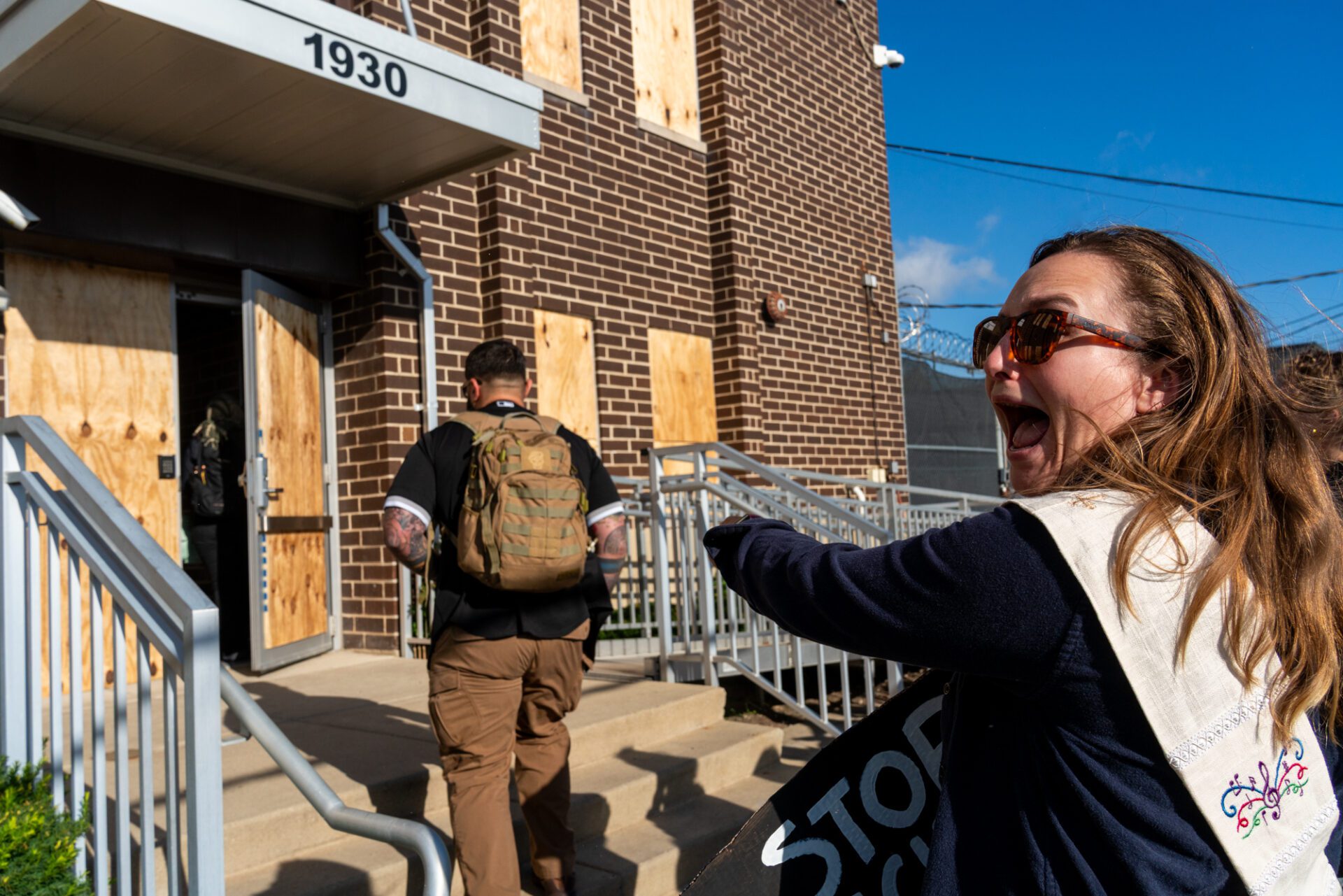 Camilla Forte/Borderless Magazine/Catchlight Local/Report for America
Camilla Forte/Borderless Magazine/Catchlight Local/Report for AmericaThe Illinois National Guard has not been activated, but federal immigration agents have arrived in Chicago. Now, elected officials and community groups are bolstering Know Your Right efforts across the city.
It’s uncertain whether President Donald Trump will follow through on his threats to send National Guard troops to Chicago. But the president is facing pushback from Illinois Gov. JB Pritzker and a judge’s ruling that his use of troops in California violated federal law.
Over the last few weeks, Pritzker and Trump have sparred publicly over the president’s threats of sending the National Guard to Chicago. Trump cited crime as the need for the National Guard, even as homicides and other crime rates have fallen in the city. From June to August, a WBEZ analysis found homicides had hit a 60-year low in Chicago.
Pritzker and other local officials called the threats by Trump “unconstitutional,” “un-American” and an “abuse of power.”
News that puts power under the spotlight and communities at the center.
Sign up for our free newsletter and get updates twice a week.
The back-and-forth occurs as Chicagoans prepare to celebrate several cultural events in the coming weeks, including Mexican Independence Day.
“None of this is about fighting crime or making Chicago safer,” Pritzker said. “For Trump, it’s about testing his power and producing a political drama to cover up his corruption.”
Earlier this summer, Trump deployed the National Guard to Los Angeles without consent from California Gov. Gavin Newsom. Like in Chicago, Trump said troops were in Los Angeles to quell crime. However, according to a U.S. district judge’s ruling, the National Guard and the U.S. Marines were used to support domestic law enforcement — an overreach of the president’s authority.
U.S. District Judge Charles R. Breyer said Trump violated the Posse Comitatus Act, a law preventing the president from using the National Guard as a police force.
In a 52-page opinion, Judge Breyer wrote that Trump, Secretary of Defense Pete Hegseth, and the Department of Defense “systematically” used “armed soldiers (whose identity was often obscured by protective armor) and military vehicles to set up protective perimeters and traffic blockades, engage in crowd control and otherwise demonstrate a military presence in and around Los Angeles.” (Read the full opinion here.)
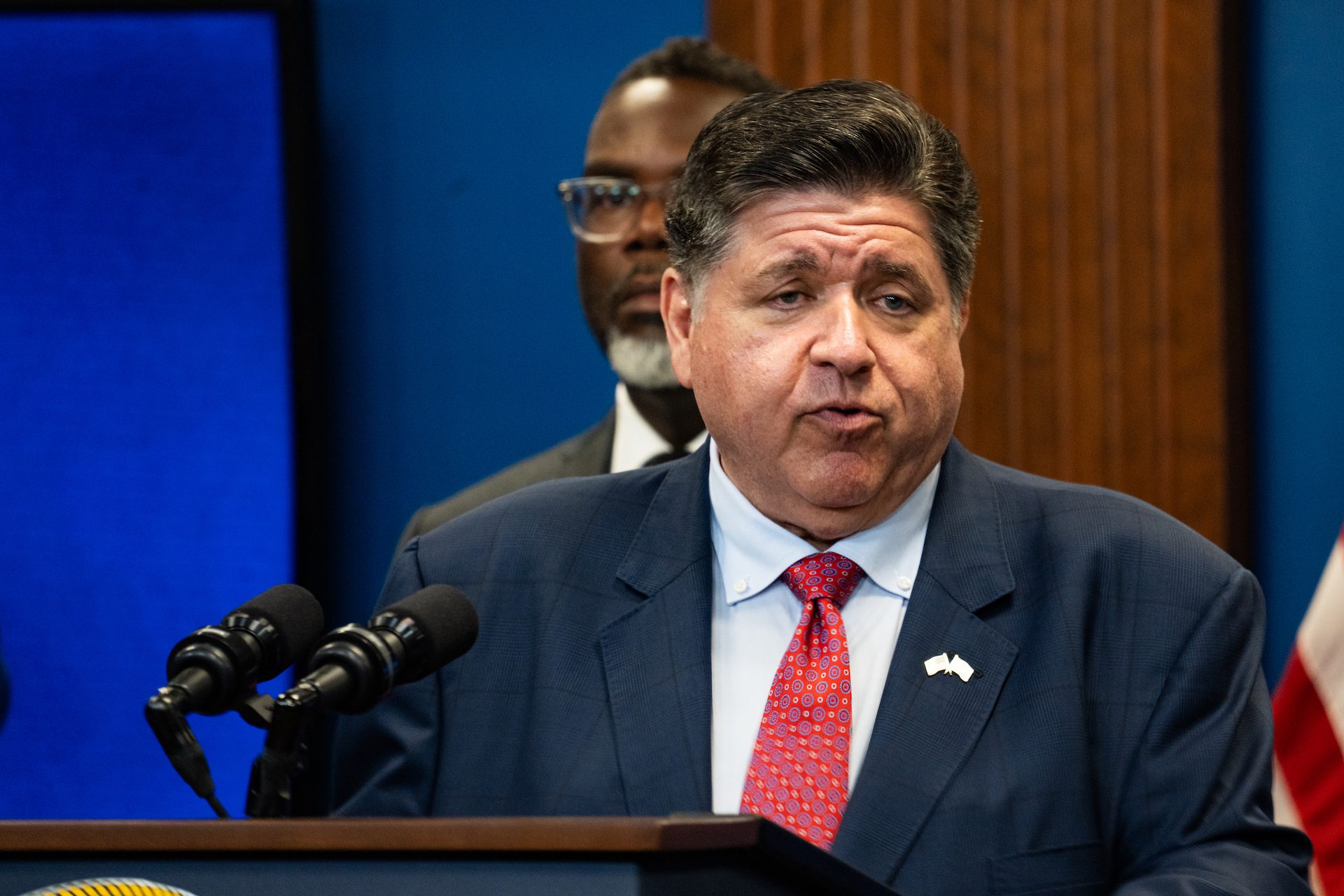
Should the National Guard be deployed, Pritzker said the state was “ready to fight troop deployments in court, and we will do everything possible to ensure that agents operating inside the confines of this state do so in a legal and ethical manner.”
Illinois National Guard hasn’t received an order to activate
As of Thursday, the Illinois National Guard had not received an “activation order,” according to William Grove, deputy director of public affairs for the Illinois National Guard.
National Guard members can receive active duty orders from the president for federal service under Title 10 or from a state governor under Title 32 for homeland defense or operational support. A governor can also issue a State Active Duty order for state-level emergencies.
When National Guard members are deployed under Title 10, a federal status, they are generally prohibited from domestic law enforcement actions — meaning they cannot arrest civilians unless approved by Congress or in rare circumstances.
Still, Pritzker said on Tuesday that “armed military personnel” could be deployed from Texas.
In a statement, Abbott’s Press Secretary Andrew Mahaler said the governor and “the State of Texas are ready, willing, and able to deploy all necessary resources to clean up the streets of Chicago should President Trump call upon us to do so.”
Mahaler didn’t respond to Borderless questions on whether such a move would violate federal laws, including the Posse Comitatus Act.
Read More of Our Coverage
Legal advocacy groups such as the American Civil Liberties Union of Illinois have argued that Trump’s threats stand on uncertain legal ground without a clear justification for federalizing National Guard troops and without Pritzker’s order.
“Until we see a specific order and justification for sending federal forces, it is difficult to know the legality of that order,” said Ed Yohnka, communications director for the ACLU of Illinois. “It is clear that there is no emergency that justifies the introduction of these forces into Chicago.”
Illinois Veterans urged service members to resist deployment.
Could the National Guard still be deployed?
The U.S. president and state governors may call on the National Guard for large-scale crises or national disasters, but the move to send the National Guard from another state would be unprecedented.
Historically, the federal government has used the National Guard dozens of times for conflicts and hundreds more for local crises and national emergencies, Al Jazeera reported.
In 1965, President Lyndon B. Johnson sent out over 3,000 troops to Selma, Ala. to protect civil rights demonstrators without a request from the state’s governor.
Federal troops were also dispatched to respond to the LA Riots in the ‘90s, Hurricane Katrina in 2015, the COVID-19 pandemic and the Black Lives Matter protests in 2020 in several cities, including Chicago.
Most recently, Trump said he dispatched the National Guard to D.C. to fight crime, even though the city has seen the lowest levels of violent crime in 30 years, according to data from the D.C. Metropolitan Police Department.
Still, legal advocates say it’s rare for the president to deploy the National Guard without a state’s consent.
The Tenth Amendment states that any powers not given to the federal government are under the authority of the states or the people. It prohibits the federal government from compelling states and local governments to participate in immigration enforcement.
In Illinois, the TRUST Act, signed into law by Republican Gov. Bruce Rauner in 2017, prohibits local police from working with U.S. Immigration and Customs Enforcement (ICE) unless ordered by a judge.
Local law enforcement has said they will follow state law and not assist with federal immigration enforcement.
Police officers will also be required to wear their uniforms so they can be “clearly identified,” according to reporting from WTTW.
National Guard isn’t here — but federal immigration officers are
While an activation order for the Illinois National Guard has not been made, federal immigration officials have set up a staging area north of the city at the Great Lakes Naval Base in North Chicago, according to Greg Jackson, the North Chicago Mayor’s chief of staff.
Jackson said federal immigration officials will use the base as a logistics headquarters for enforcement activity.
The Great Lakes Naval Base is one of the U.S. Navy’s largest training facilities. It is located in suburban North Chicago, about one hour north of metropolitan Chicago.
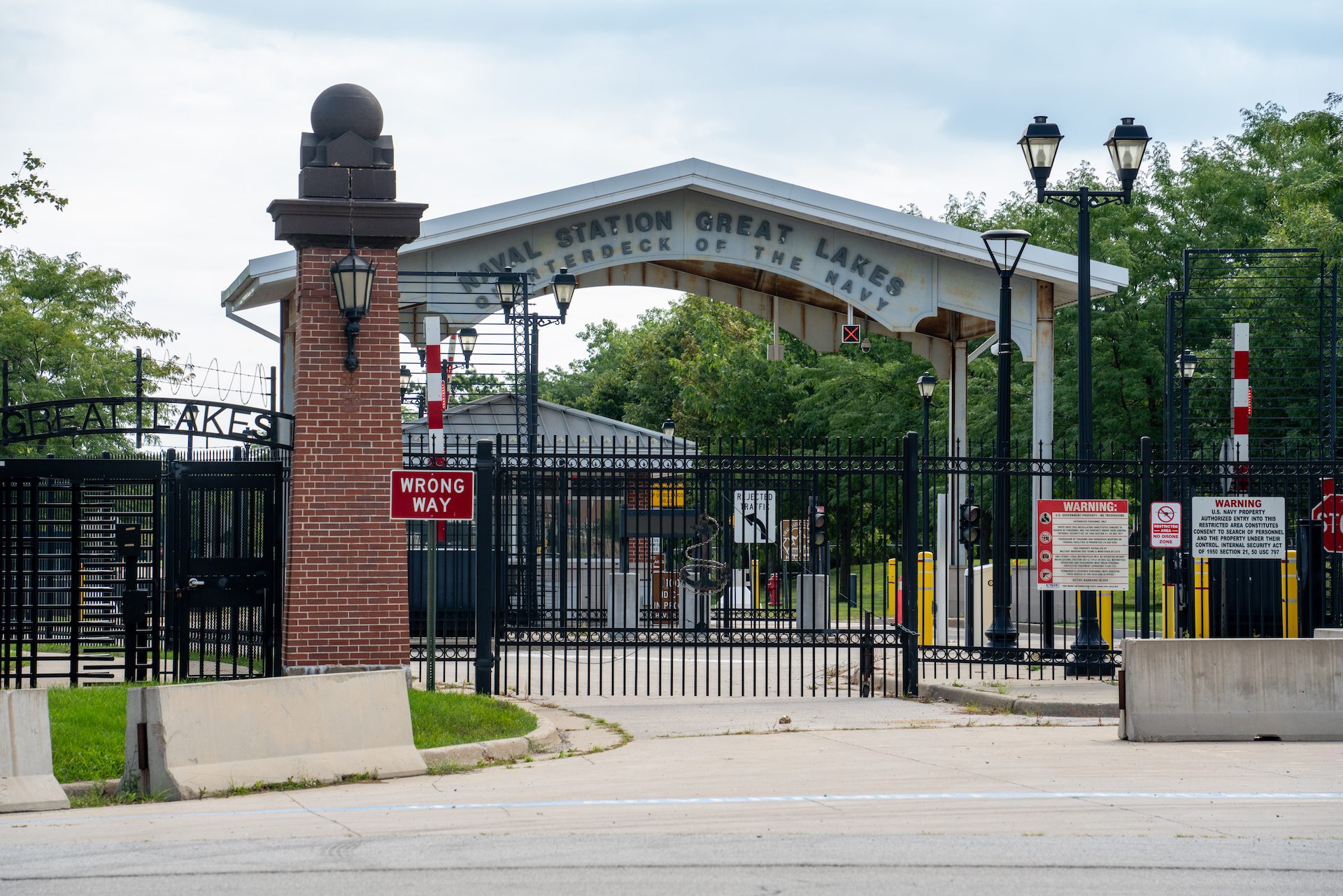
The site’s use will be “strictly operational” to “store equipment, technology, and infrastructure” — not to house immigration enforcement officers, Jackson said.
An estimated 300 immigration enforcement officers would be deployed as part of the “incursion” ordered by Trump, Jackson said.
A spokesperson for Great Lakes Naval Base did not respond to questions from Borderless Magazine.
How are communities responding?
Chicago cultural celebrations and festivals have adapted by incorporating additional security measures or canceling events outright in the face of immigration enforcement activity.
But facing heightened threats from potential National Guard deployment, organizers of El Grito, an annual event celebrating Mexican Independence Day, canceled the downtown event.
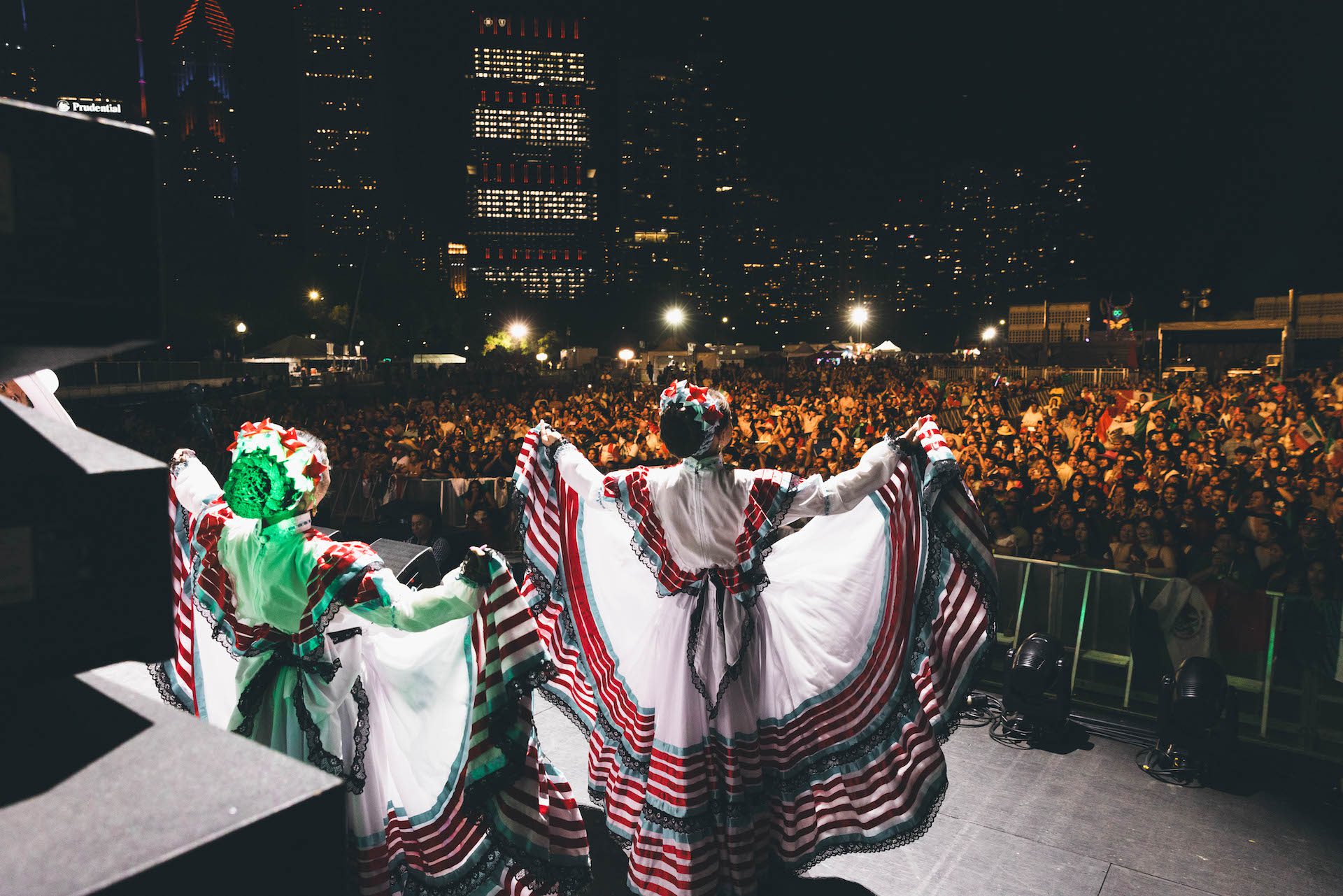
“This was a painful decision; however, with the heightened political tensions and given our location in downtown Chicago, we need to keep our community safe,” said German Gonzalez, an El Grito organizer. “To proceed in spite of the advice we’ve received directly from the city and state officials and potentially expose our community to becoming collateral damage would be irresponsible. That’s a risk we are not willing to take.”
City officials denied urging organizers to cancel the event.
Similarly, in North Chicago, the Fiesta Patrias Mexican Independence Day parade was postponed due to ICE concerns.
“The organizer decided not to move forward with it until they get a sense of what’s taking place with immigration enforcement,” Jackson said.
Read More of Our Coverage
While some celebrations have been canceled, advocacy organizations have renewed pushes for public protests downtown and at ICE facilities to push back against the Trump administration’s National Guard and immigration enforcement threats.
At the ICE processing center in Broadview, Ill., protestors gathered throughout the day on Friday to decry conditions within the facility and to share their concerns for immigrant neighbors detained there.
Some advocates will host protests this weekend, while groups like Pilsen Unidos por Nuestro Orgullo’s (PUÑO) Migra Watch team will host a training on how to identify federal agents, document ICE activity, and support immigrants on Sunday, Sept. 7, at 2172 W. Cermak Road from 1 to 3 p.m.
What are your rights?
Since Trump’s inauguration, elected officials, community organizations, and advocacy groups have worked to distribute Know Your Rights workshops and pamphlets to residents facing heightened immigration enforcement.
All immigrants in the U.S. have rights, regardless of status.
Under the Fifth Amendment of the U.S. Constitution, noncitizens are not required to speak with ICE agents, answer their questions or sign any paperwork.
All people are also entitled to:
- Ask whether they are being detained
- Walk away from an ICE interaction if they are not being detained
- Refuse to be searched (ICE agents can only search you if they have your consent or reasonable suspicion)
- Not open the door if an ICE official is knocking (ICE officials cannot search your home without consent)
- And hire a lawyer
It is also within a person’s rights to film interactions with ICE agents in public spaces.
While these rights are guaranteed to all under the U.S. Constitution, there have been instances where federal agents have violated people’s Constitutional rights.
Read More of Our Coverage
However, immigration advocates say recordings of ICE agents making arrests can help verify whether an ICE agent conducted an unlawful arrest — and can be used in court to hold ICE agents accountable. Recordings can also help community members trying to locate a person who was detained.
It is unlawful to interfere with an immigration arrest while it is occurring. Instead, advocates recommend asking the person being detained what their name is and for a family member’s phone number, and asking agents whether they have a warrant for an individual’s arrest.
Immigrant rights groups also recommend speaking with a lawyer if you choose to answer questions when facing an immigration officer.
What Resources are Available?
In June, Illinois advocacy groups launched an online resource for immigrant families in Illinois with information on where individuals can get connected with legal support and additional guidance.
Additionally, ICIRR has a Family Support Hotline at (1-855-435-7693) if you need help locating someone in ICE custody or would like to report an ICE sighting in your community.
Know Your Rights Information is also available in multiple languages:
- Spanish: The Resurrection Project
- Korean: National Korean American Service and Education Consortium (NAKASEC)
- Chinese: Coalition For A Better Chinese American Community
- Tagalog: AFIRE Chicago
- Arabic: CAIR-Chicago
- Urdu: CAIR-Chicago
Read on to learn what rights you are entitled to here in Chicago, regardless of immigration status.
Aydali Campa, Camilla Forte and Tara Mobasher contributed to this report.
Do you have any questions? Please reach out to Borderless Magazine’s reporters or [email protected].
